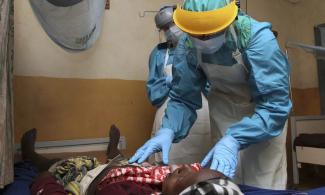
The Acting Corp Commander Medical (CCM) of the Nigerian Army, Brigadier General S.O. Okoigi disclosed this in an internal memo dated February 21, 2024.
The Nigerian Army says the Accident and Emergency, A&E, Department of 44 Nigerian Army Reference Hospital, Kaduna, lost three members of staff and a patient to acute Viral Hemorrhagic Fever, VHF within 48 hours.
The Acting Corp Commander Medical (CCM) of the Nigerian Army, Brigadier General S.O. Okoigi disclosed this in an internal memo dated February 21, 2024.
He disclosed that samples had been sent to the Nigeria Centre for Disease Control for analysis.
VHFs are a group of diseases that are caused by several distinct families of viruses.
The term “viral hemorrhagic fever” refers to a condition that affects many organ systems of the body, damages the overall cardiovascular system, and reduces the body’s ability to function on its own.
In Nigeria, VHFs of concern include Lassa fever, Ebola, Dengue fever and Yellow fever.
Symptoms can vary but often include bleeding or haemorrhaging. Some VHFs cause relatively mild illness, while others can cause severe, life-threatening disease. Most VHFs have no known cure or vaccine.
Okoigi in the memo also highlighted the substantial risk faced by healthcare workers in contracting Viral Hemorrhagic Fever, urging enhanced Infection Prevention and Control practices across all Nigerian Army health facilities.
It read, “The Accident and Emergency (A&E) Dept of 44 NARHK has witnessed the loss of 3 members of staff and a patient in the last 48 hours with some in critical condition. They are suspected to have died from Acute Viral Hemorrhagic Fever (VHF).
“This followed the management of a patient with febrile illness thought to have been the index patient with the disease 10 days ago, having presented with a febrile illness.
“The patient also died from the suspected disease condition. The common symptoms in those affected included fever, and non-specific symptoms likened to malaria. However, the illness was complicated by abnormal liver function, acute kidney failure, encephalopathy, microangiopathy, elevated D-Dimer among others.
“The A&E has been closed for thorough disinfection process and samples have been taken from suspected contacts and the deceased and sent to the Nigeria Centre for Disease Control (NCDC) laboratory in Kano for analysis. Similarly, the Kaduna state Epidemiologists have been invited to help in unraveling the aetiology of the febrile illness with a view to curtailing the spread of the disease.
“This is in addition to strict disease Infection Prevention and Control (IPC) measures that have been directed to be emplaced.
“Ribavirin injection (antiviral agent) has also been commenced on other suspected cases and those identified on contact tracing. 44 NARHK have also been directed to suspend accepting new cases from the general public in the interim while the situation is being contained.”